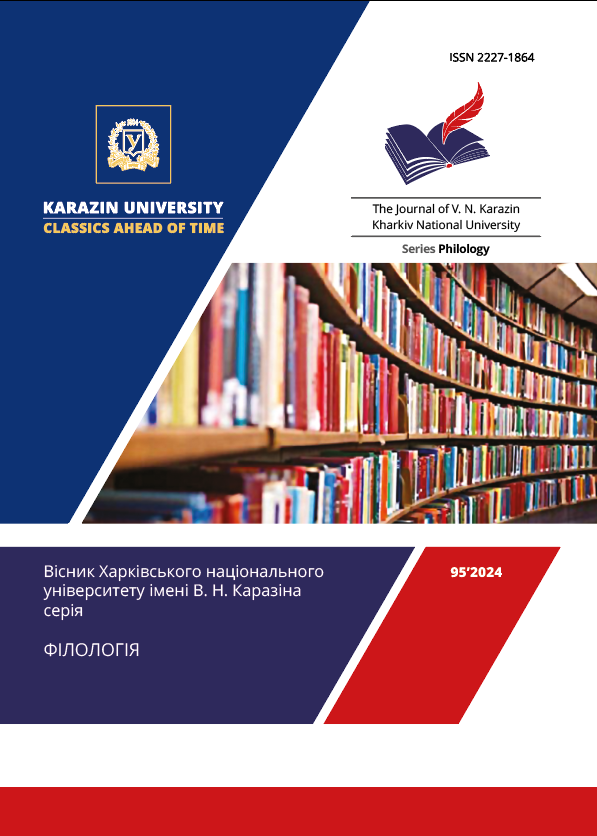The Anthropology of Love by Ingeborg Bachmann (“War Diary” and “The Book of Franza”)
Abstract
The article is dedicated to the study of the work of the Austrian writer Ingeborg Bachmann (1926–1973), which involves the investigation of specific examples of fictional and non-fictional literature using the principles of literary anthropology. In particular, the «War Diary» («Kriegstagebuch», 1944–1945) and the unfinished novel «The Book of Franza» («Das Buch Franza», 1965–1966) are considered comparatively. The purpose of the article is an anthropological analysis of the cultural universality of love, which is based on the author’s own life experience and is artistically reinterpreted in her texts.
The role of the British soldier, the Viennese Jewish émigré Jack Hamesh (1920–1987) is emphasized in rereading «The Book of Franza». His image is embodied in the figure of Lord Percival Glyde (Percy), a captain of the English army, with whom the protagonist of Franza’s novel falls in love during the deoccupation of the Carinthia region. I. Bachmann’s notes in the form of a diary and 11 letters from the young man to her demonstrate the feelings of both.
The main aspects of the artistic transformation of the writer’s «first» love for J. Hamesh are emphasized, considering the time-space context of the depicted events, which are accompanied by existential challenges for a person (the end of the Second World War). The literary character Percy summarizes the image of the British military, with whom the writer communicated at the time, and the receptive potential of his allusive anthroponym, which hints at the status of the «pseudo-couple». In addition, attention is paid to the idealization of his figure, which indicates the replacement of the real image with the metalogical one with hyperbolization of the characteristic features of the prototype, to enhance the effect in depicting the first romantic relationship of I. Bachmann.
The anthropological dimension of love between a man and a woman shows the importance of fictional and non-fictional literature for the artistic rereading of life experience, representing a generalized vision of love by I. Bachmann.
Downloads
References
Bartish, S., Derkach, H. (2024). Theoretical basis of the anthropological approach in literary studies. Studia methodologica, No. 57, 51–60. DOI: https://doi.org/10.32782/2307-1222.2024-57-5 [in Ukrainian].
Havryliv, T. (2009). Shape and Figure. Identity of Artistic Space. Lviv: VNTL-Classic. 480 p. [in Ukrainian].
Haleta, O. (2014). Eccentric literary criticism: from theory of literature to literary anthropology. Visnyk of the Lviv University. Series Philology. Vol. 60 (2), 46–58.
Zambrzycka, M. (2013). Anthropology of literature in the Polish literary studies. Problems of Literary Criticism. No. 87, 88–96 [in Ukrainian].
Polishhuk, Y. (2013). Anthropological perspective in literary studies. Philological seminars. No. 16, 26–31 [in Ukrainian].
Tarnashynska, L. (2009). Literary anthropology: a new methodological project in the mirror of philosophical analogies. World and time. No. 5, 48–62 [in Ukrainian].
Albrecht, M. (2004). «Sire, this village is yours». Ingeborg Bachmann’s novel fragment The Book of Franza from a postcolonial perspective. Ingeborg Bachmann / Ed. by Robert Pichl and Barbara Agnese. Rome: Donzelli, 167–178. [in German].
Bachmann, I., Bischof, P. (1991). Letters to Felician. Munich: Piper Publ., 49 p. [in German].
Bachmann, I. (1995). The Book of Franza / [Ed. by Monika Albrecht, Dirk Göttsche, Robert Pichl]. The «Ways of Dying» Project: Critical Edition in 4 Vol. (Vol. 2). Munich; Zürich: Piper Publ., 502 p. [in German].
Bachmann, I. (2011). War Diary: With Letters from Jack Hamesh to Ingeborg Bachmann / [Ed. and with an afterword by Hans Höller]. Berlin: Suhrkamp Publ. 112 p. [in German].
Hapkemeyer, A. (1984). The language topic in Ingeborg Bachmann’s prose: types of death and language forms. Frankfurt am Main; Bern: Lang Publ., 123 p. [in German].
(1984). Ingeborg Bachmann / [Ed. by Heinz Ludwig Arnold]. Munich: Ed. Text + Kritik, 217 p. [in German].
Isaptschuk, Ju. (2024). Ingeborg Bachmann’s «The Book of Franza»: Reconstruction of Local Topoi. Acta Facultatis Philosophicae Universitatis Ostraviensis. Studia Germanistica. No 34. 77–88. DOI: doi.org/10.15452/StudiaGermanistica.2024.34.0005 [in German].
Iser, W. (1993). The Fictive and Imaginary: Charting Literary Anthropology. Baltimore: Johns Hopkins University Press. 347 p. [in English].
Lennox, S. (2006). Cemetery of the Murdered Daughters: Feminism, History, and Ingeborg Bachmann. Amherst: University of Massachusetts Press, 387 p. [in English].
Schaunig, R. (2014). «... as if on sore feet» Ingeborg Bachmann’s early years. Klagenfurt / Celovec: Johannes Heyn Publ., 256 p. [in German].
Stoll, A. (2013). Ingeborg Bachmann: the dark glow of freedom. The biography. Munich: C. Bertelsmann Publ., 381 p. [in German].
Užukauskaitė, L. (2021). The beautiful in Ingeborg Bachmann’s work: on the topicality of a central aesthetic category after 1945. Heidelberg: University Publ. Winter, 288 p. [in German].
(2004). Perception and action: perspectives of a literary anthropology / [Ed. by Wolfgang Braungart, Klaus Ridder, Friedmar Apel]. Bielefeld: Aisthesis Publ., 368 p. [in German].




